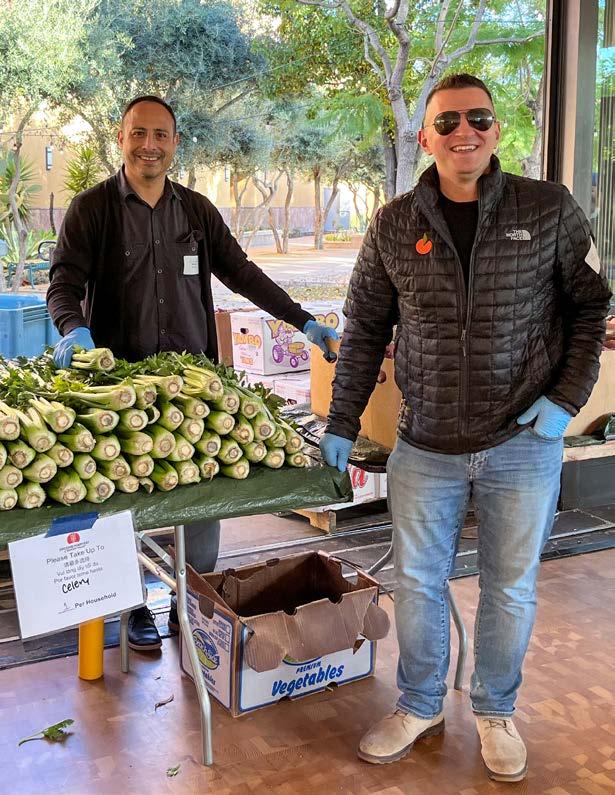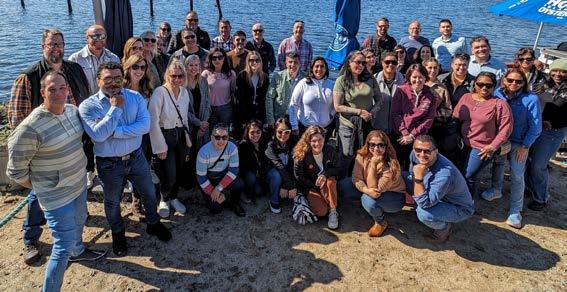




U.S. LOCATIONS
February 2024
Welcome to Good Eating Company’s 2024 Impact Report, covering calendar year 2023. As we navigate the ever-evolving landscape of sustainability and corporate responsibility, we are excited to present an overview of our initiatives, achievements, and ongoing commitments to fostering positive change within the foodservice sector.
Since our U.S. launch in 2020, we are proud to now serve 60+ clients and sites. At the core of our operations are a group of passionate culinarians who drive innovation by crafting delicious, authentic menus that support people and the planet. We take pride in our diverse supplier network, which includes local, small-scale, BIPOC-owned, and women-led enterprises, adding vibrant and authentic dimension to our flavors and stories.
In this report, we will share the fundamental principles guiding our sustainability strategy, highlighting the impact of our efforts on the food system. We are committed to doing things differently, investing in thoughtful growth, and innovating for our clients and our people. Prioritizing sustainability is a social and environmental imperative and a smart business decision that promises dividends for our company and communities where we operate. Our approach is centered on sustainable food and food systems literacy, cultivating a culture of care, and building meaningful partnerships that catalyze our work.
We invite you to explore the stories that define our commitment to sustainability and corporate responsibility. Together, we can create a future where good food nourishes not only the body but also the planet and communities we serve.
Thank you for joining us on this journey towards a more sustainable and inclusive food system.
Mike Gillespie PRESIDENT Renee McKeon VICE PRESIDENT OF SUSTAINABILITY & CSR
Renee McKeon VICE PRESIDENT OF SUSTAINABILITY & CSR
 Claire Turner DIRECTOR OF SUSTAINABILITY
Claire Turner DIRECTOR OF SUSTAINABILITY
... and driving positive change in the foodservice sector. As a company dedicated to sustainable eating, reducing food waste, and promoting plant-based diets, this report highlights the significant impact of the Good Eating Company team in providing eco-friendly dining experiences that go above and beyond our clients’ expectations. “
 MIKE GILLESPIE PRESIDENT
MIKE GILLESPIE PRESIDENT

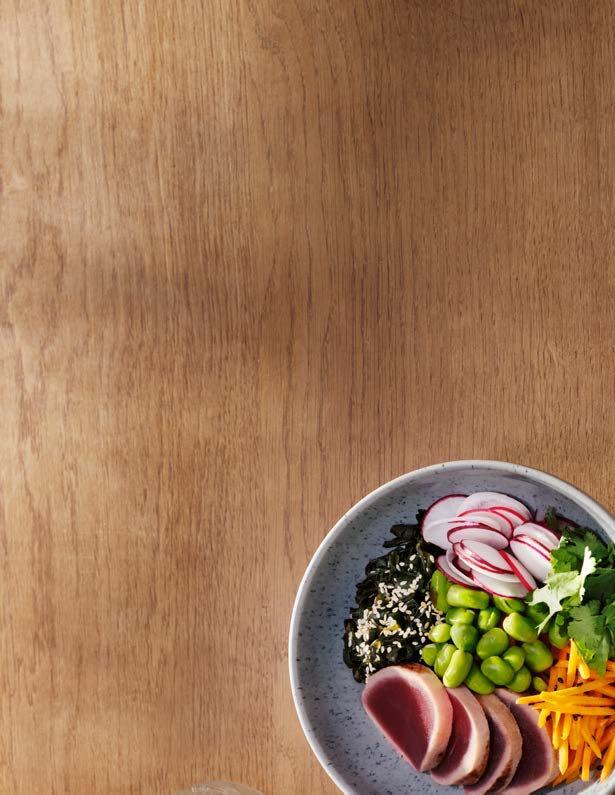
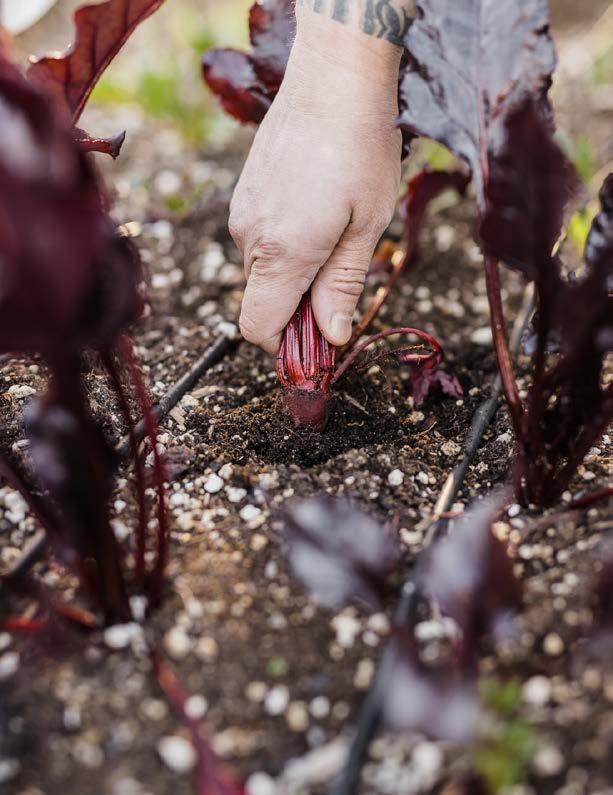
Good Eating Company’s sustainability strategy is built on four primary pillars:

These pillars serve as the guiding framework for our various sustainability initiatives. Throughout this report, we provide a comprehensive overview of our progress and achievements across each pillar of our sustainability strategy.


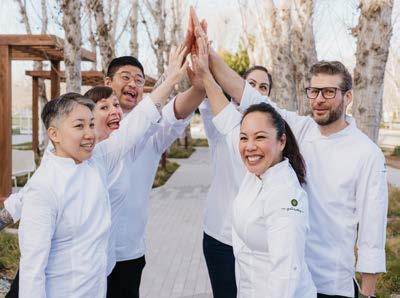
AMY LEE, CULINARY DIRECTOR | ALICIA JENISH-MCCARRON, CULINARY DIRECTOR
RHON CONLU, EXECUTIVE CHEF | MELODY MIRANDA, SR. CULINARY DIRECTOR
TONY EJARQUE, EXECUTIVE PASTRY CHEF | SUMMER ROSAL, EXECUTIVE CHEF
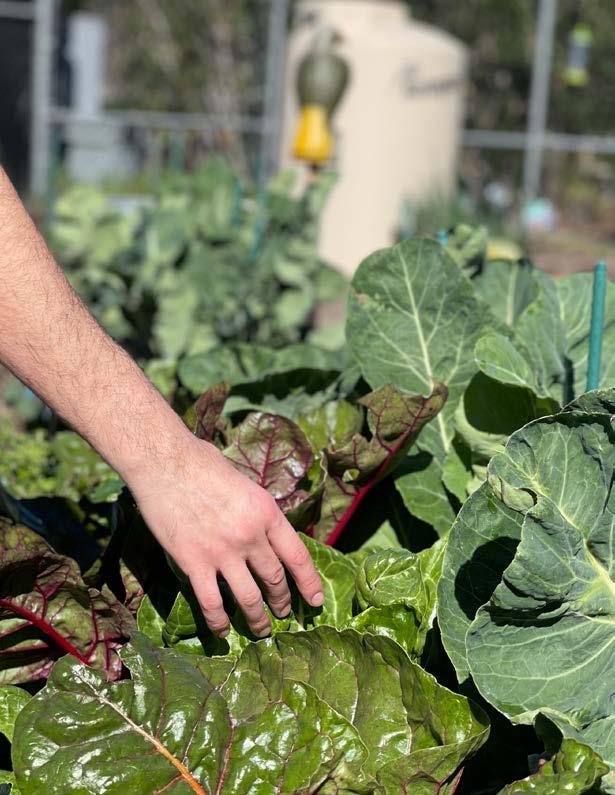
Aligned with our parent company, Sodexo's SBTi (Science Based Target Initiative) validated net zero carbon target, Good Eating Company diligently works to reduce carbon emissions within our operations. 99% of our emissions fall within Scope 3, with the two primary impacts being energy use on site and our supply chain. Therefore, our work to reduce our emissions relies heavily on external partnerships.
Working with suppliers to reduce the carbon footprint of the supply chain through strategic product selection and suppliers’ operations.
Training and engaging our teams to deliver sustainable solutions to clients and consumers, prioritizing our food service value chain.
Reducing energy consumption and accelerating the use of renewable energy in cooperation with our clients.
Accelerating efforts to reduce food waste.




Picture this: you stroll into one of our bustling barista bars, ready for your morning caffeine fix. The aroma of freshly brewed coffee greets you. You order your usual latte, only for the barista to ask, “Will oat milk be ok with that?” Why? This simple switch is how Good Eating Company is championing a new trend in cafes with an alternative to dairy as the default option for handcrafted drinks.
We believe in providing not just great taste, but also sustainable choices that align with our commitment to reducing our carbon footprint. By making oat milk the default choice across all our barista bars, we normalize low carbon options. Defaulting to plant-based is also more inclusive to the 30-50 million Americans who are lactose intolerant or those who avoid milk due to allergies, religious restrictions or just personal preference. It’s all part of our greater effort to expand our palates while elevating an inclusive dining experience.
Our commitment to providing sustainable choices is a core value that drives every decision we make. At Good Eating Company, we’re building a food system that benefits both communities and ecosystems, one oat milk latte at a time.
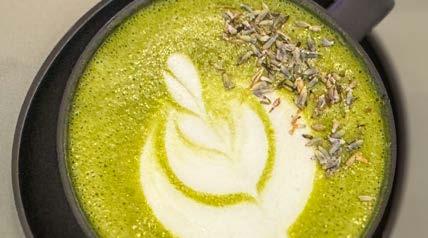

CLIENT SITE 1

CLIENT SITE 2
UNIVERSITY COFFEE SHOP CAFE
THE CARBON FOOTPRINT FROM MILK WAS REDUCED BY HALF, WITH DAIRY MILK DECREASING FROM 70% TO 18% OF ALL MILK SERVED.
A STEADY INCREASE IN PLANT-BASED MILK ORDERS RESULTED IN A REDUCTION IN SCOPE 3 EMISSIONS. PLANT-BASED MILK IS NOW 60% OF TOTAL MILK PURCHASES (IN GALLONS).
DEFAULTING TO OAT MILK LED TO A 32% REDUCTION OF DAIRY CONSUMPTION, RESULTING IN DECREASED EMISSIONS, LAND AND WATER USE BY 25%.
BEHIND THE SCENES AT THE GOOD EATING COMPANY, A CULINARY REVOLUTION IS UNDERWAY – AND IT ALL STARTED WITH OUR DEDICATED TEAM OF CHEFS.
Our partnership with Greener By Default — an organization that applies behavioral science to food policy and encourages interest in sustainable plant-based food options while preserving freedom of choice — underscores our commitment to sustainability while ensuring our foods are appetizing and accessible to all diners. Through this collaboration, we’ve developed comprehensive training materials to support our culinary teams in creating vibrant plant-based menus. We believe that by empowering our chefs with the knowledge and skills to innovate with plant-based ingredients, we can offer exciting culinary experiences while staying true to our values.
Through our partnership with Greener By Default, we’re changing what’s on the plate, and also how it’s prepared. Our culinary teams undergo rigorous training to explore new flavor profiles, experiment with seasonings and craft innovative dishes from around the world. In October 2023, 10 of our chefs participated in a three-day hands-on training at the Culinary Institute of America at Copia in Napa, California, expanding their culinary horizons and honing their skills in plant-based cooking.
By investing in our chefs’ development and providing them with the tools to excel in plant-based cuisine, we are creating delicious meals and shaping the future of sustainable dining.
“We’re enhancing their learning and expanding horizons as we continue to champion plant-based menus because our chefs have the power to make our food innovative and exciting.”
MATTHEW KLIFF, SENIOR MANAGER OF LEARNING SOLUTIONS



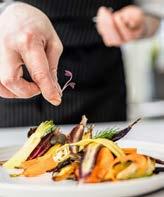
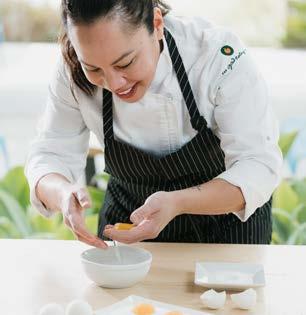
Good Eating Company utilizes a strategy of defaulting to plant-based condiments, sauces, milks, side dishes and desserts, where appropriate. Our culinary team has created a robust library of plant-based recipes that include these common condiments, milks, and sauces. Chefs can utilize these base recipes to build new plant-based dishes in our menu management system. In addition to a plant-based entree target, we are focused on increasing our overall plant-based procurement percentage and increasing the total number of plant-based recipes in our database. At the end of 2023, 74% of all recipes in the menu management system are plant-based or plant-forward. 40% of all recipes in the menu management system are vegan, and an additional 34% are vegetarian.
“Greener by Default was thrilled to develop resources to help The Good Eating Company team make sustainable, plant-forward food the easy and appealing choice for their customers, thereby helping to meet GEC’s carbon commitments and creating a food system that allows communities and ecosystems to thrive.”

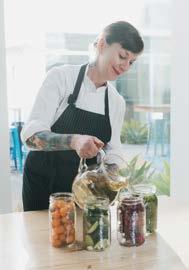
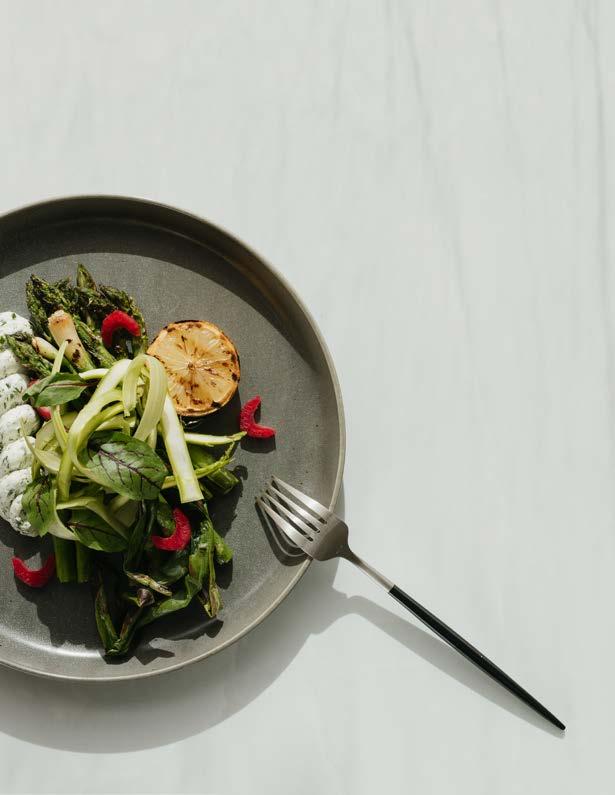

The Good Eating Company is dedicated to promoting sustainable diets and food systems literacy. With a 40% target for plant-based entrees , we spotlight whole, fresh ingredients and emphasize inclusivity. Our focus extends to upcycling ingredients to reduce methane emissions and food waste. We innovate with biodiverse, regeneratively grown produce, ensuring delicious, craveable dishes. Leveraging the latest in behavioral science research and ‘nudges,’ we make sustainable choices the default, reshaping dining experiences for a healthier future.
“The reporting process is quite rigorous, and it was gratifying to realize our efforts were helpful in retaining the overall Gold rating for the school. It has been a joy to work with Saint Mary’s College over the past year. Our goals are aligned, and we look forward to deepening the partnership in the years to come.”
CLAIRE TURNER, DIRECTOR OF SUSTAINABILITY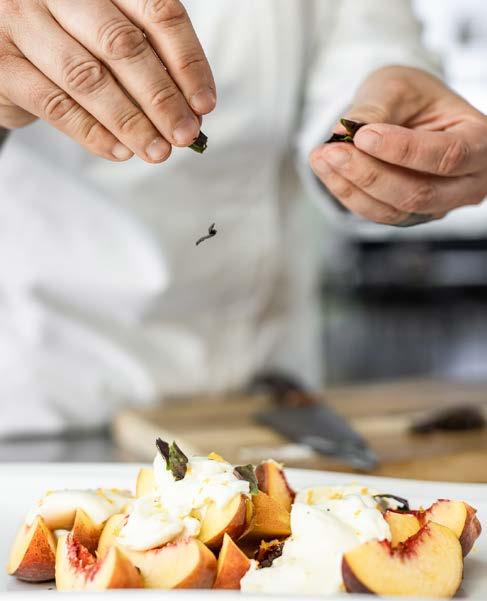
We are proud to have earned national recognition from the Association for the Advancement of Sustainability in Highter Education (AASHE) program STARS, the Sustainability Tracking, Assessment & Rating System. STARS is a transparent, self-reporting framework for colleges and universities to measure their sustainability performance.
Through our partnership with Saint Mary’s College, our sustainability program earned a coveted Gold Rating and Top 10 in the sustainable dining category based on our sustainable dining initiatives and food procurement.

As climate change challenges us to rethink our impact, more people are exploring more sustainable, plant-based eating habits. According to the International Sustainable Food Barometer study commissioned by Sodexo, 72% of Americans describe the need for a more sustainable way of eating as urgent. Embracing a diet lower in meat not only promises health advantages but can also reduce our collective carbon footprint.
While chicken, beef, and finfish dominate over 90% and 80% of U.S. menus respectively, aquatic foods like sea vegetables, clams, and mussels appear far less frequently, with clams and mussels on only 24% of menus and sea vegetables, including edible seaweeds, on just 19% (Datassential, 2023). This scarcity presents a unique opportunity for chefs and foodservice leaders to introduce the sustainable and nutritious benefits of sea vegetables, enhancing their culinary presence and encouraging broader consumption.
In the fall of 2023, an exciting opportunity to introduce and test aquatic foods at a notable client site in New York was presented in partnership with The Food for Climate League (FCL). With a shared commitment to nutrition, sustainability and biodiversity, Executive Chef Isaac Seal and developed and launched three sea vegetable-focused dishes: a hearty fusion burger, rich bolognese over cavatelli and a restorative sea vegetable salad bowl.
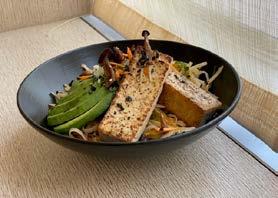

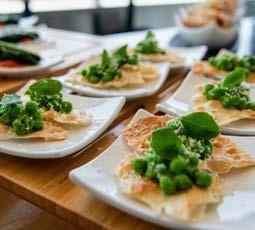
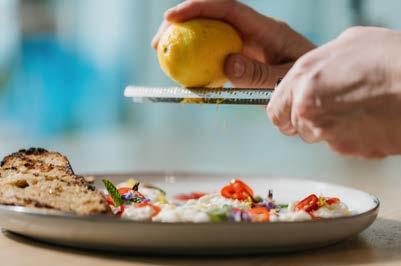


General Manager Bel Thompson reported that over 500 diners at the client site enjoyed these dishes over a six-week period, with the kelp burger being the most frequently ordered, followed by the salad bowl and the pasta.
“Introducing sea vegetables to the team was interesting and fun”, expressed Bel. “We are excited to offer more variety through these two most popular, best tasting sea vegetable options.”
At Good Eating Company, sea vegetables have swiftly become a staple on our client menus, with our on-site teams deepening their expertise in crafting diverse dishes that showcase these sustainable ingredients.
Our diners’ growing appreciation for sea vegetables has inspired us to expand our offerings, introducing innovative dishes like sea vegetable salad bowls and sea vegetable burgers across our sites nationwide. We’re committed to featuring these nourishing, ocean-derived ingredients more prominently in our menus, bringing a taste of the sea to tables across the country.
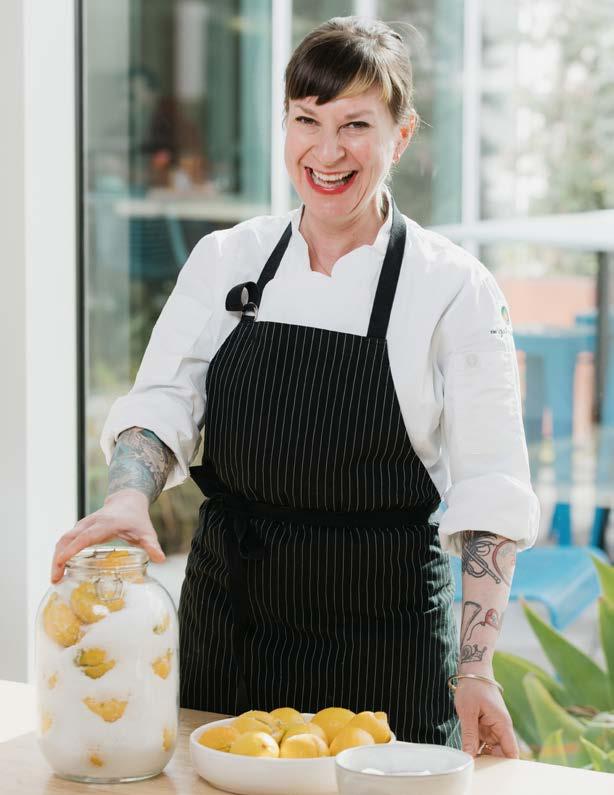
• In our efforts to reduce waste we employ a variety of strategies. At Good Eating Company, Leanpath isn’t just a tool—it’s ingrained in our culture. We utilize Leanpath to meticulously measure, report, and mitigate kitchen and post-consumer waste, often achieving a remarkable 50% reduction within just one year . We also leverage the culinary talents of our teams to embrace best practices such as crafting our own house-made products and implementing innovative upcycling methods like whole-animal and root-to-stem cooking. These approaches not only reduce waste but also maximize flavor and efficiency.
• Additionally, we actively pursue packaging reduction initiatives for single serve or take away items and collaborate with vendors to minimize waste throughout our supply chain.
• Our dedication extends to:

Proper Waste Sorting
Oil Recycling Efforts Bring Your Own Mug (BYOM) Programs
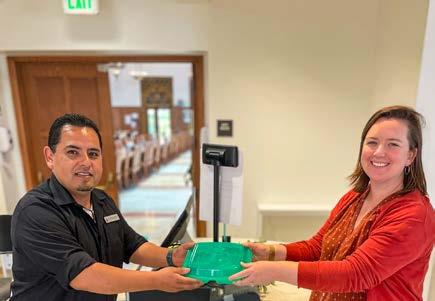
Food Recovery and Donation Programs Reusable To-Go Container
"Relationships with buyers like Good Eating Company are super meaningful for us because our 20-acre organic farm is about an hour south of Silicon Valley — we support the Bay Area as its local food shed — so harvesting and delivering directly to the companies that Good Eating Company serves is efficient and just makes sense from all the angles. Seasonality and climate dictate the types and timing of the crops we grow, and every year inevitably there is a peak harvest volume that we reach, when we have more fruit on the vines than we have customers for.
This past year was especially difficult because our farm and many in our area got a ton of rain during the late Spring storms, (our farm actually flooded,) which prevented us from planting our first round of tomatoes, and by the time the soil finally drained and we could get in to plant, our second succession of transplants was already on the calendar to plant. These factors led to an oversupplied market for tomatoes, and was why we were scrambling for takers for our vine ripened heirlooms and dry farmed tomatoes. The fact that Good Eating Company could make connections to chefs that had the flexibility to adjust their menus and get creative with our bumper crop of tomatoes helped our farm receive payment back for the investment we put into growing the crop, and reduce food lost in the fields.”
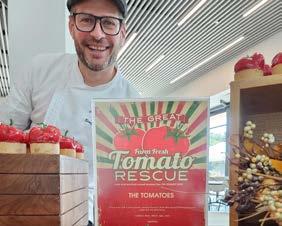
 MARSHA HABIB, OYA ORGANIC FARM
MARSHA HABIB, OYA ORGANIC FARM
In our bustling kitchens, innovation takes on a delicious form through upcycled food creations. With a fervent dedication to combating food waste, we have forged meaningful partnerships with pioneering organizations like Matriark, a food production company with the mission to upcycle vegetable surplus into healthy foodservice advancing the health of people and the environment. Alicia Jenish-McCarron, Culinary Director, as well as a passionate advocate for upcycled foods, shares her insights on this impactful journey.
“We’ve been partnering with Matriark and hosting calls intended to inspire chefs to delve into their own culinary creativity to tackle food waste,” Alicia explains. Through coaching and collaboration, chefs are empowered to seek out opportunities to upcycle within their own communities. With new recipe development, they’ve begun to unearth a world of possibilities, transforming overlooked ingredients into culinary delights.
Some examples of upcycled foods include making soup from vegetable trimming, turning carrot tops into pesto, or making homemade oat and almond milk. Alicia’s enthusiasm is infectious as she describes their efforts to rescue “ugly” vegetables and surplus produce from local farms. “There’s a lot of things that you can do yourself, in addition to partnering with a company like Matriark to help curb food waste,” she emphasizes.
The impact reverberates beyond the kitchen, benefiting both the environment and the bottom line. Upcycling is holistically beneficial because it is also cost-effective. As Alicia succinctly says, “By working with your produce vendors and local farms to find perfectly good food that is going to waste, you can start looking to curb food waste in your own community, too.”
With each upcycled dish crafted, we offer a flavorful solution to a global challenge, one bite at a time.

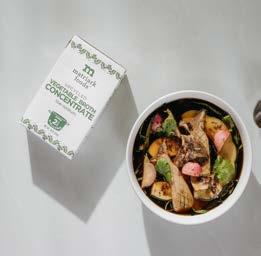

Our food waste management tool, WasteWatch powered by Leanpath, empowers our teams to easily capture food waste data and take action in real-time to help reduce food waste in the kitchen. From this program, our sites have cut down their pre-consumer food waste by an impressive 44.46% collectively .
In 2023, our sites worked together to prevent an additional 63 tons of surplus food from being thrown away. That is the equivalent to the weight of a fully loaded semi-truck.
Not only are we dedicated to minimizing food waste, but we’re also ensuring surplus food finds its way to those who need it most, reflecting our unwavering commitment to benefiting the environment and our community. Over the past year, we’ve lovingly donated 10,123.61 lbs. to communities in need, providing over 8,500 meals to individuals facing food insecurity.

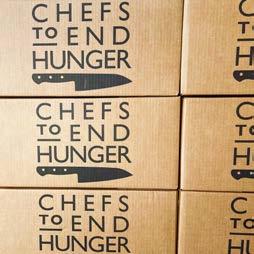

Plastic production, 64 percent of which is the nondurable type meant for short-term use, has significantly increased over the last few decades. Everywhere we look, there are to-go containers that will inevitably end up in a landfill. In our commitment to combat this issue, we actively seek partnerships with organizations sharing our sustainability goals. Collaborating with Saint Mary’s College of California is particularly fitting for our sustainability efforts. The campus has implemented a reusable togo container system in Oliver Hall since 2017. However, upon assuming management of the account, GEC identified opportunities for enhancing the system.
Reusable container programs are notoriously difficult to implement, because users often treat them as if they were disposable. The thick plastic construction means that even a single use renders them environmentally detrimental, defeating the purpose of their eco-friendly design.
Enter Topanga, a company offering a tech-enabled reusable to-go solution that caught the attention of GEC. The streamlined process involves students and faculty signing up for the reuse program. When opting for a to-go meal, they simply scan their personal QR code and the cashier scans the reusable container. This linkage creates a connection between the individual and the specific container.
Participants receive a reminder via text about the due date for returning the container. The school then washes the containers and they go back out into circulation, where they can be used hundreds more times.
The numbers just in one semester speak to the success of the program: were kept from the landfill 1,344 Containers
That’s the equivalent of 126 lbs of waste diverted, or approximately .4 metric tons of CO2 greenhouse gases
“ We have seen a consistent 96% return rate, so it’s been great, ” says Claire Turner, our Director of Sustainability. “There’s not a lot of friction on the operators and the cashiers have an easy time with the system. We’re looking to expand it in the coffee shop to offer a reusable cup program and implementing reuseable containers for our grab-and-go items.”

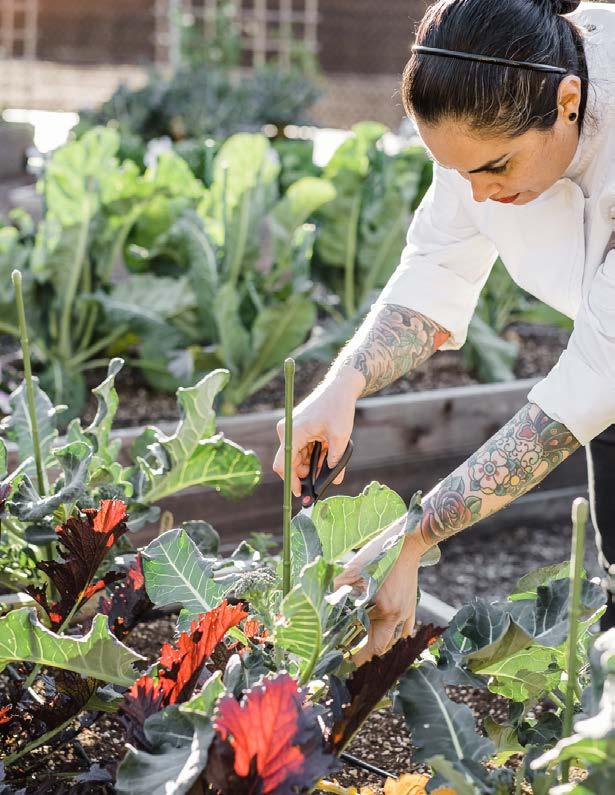

At Good Eating Company, our dedication to social impact drives us to forge meaningful partnerships and inspire collective action. Recognizing that sustainable progress necessitates collaboration, we actively engage with stakeholders across the spectrum— including senior leaders, culinarians, suppliers, and clients—to propel our sustainability agenda forward. Through coordinated strategies and partnerships with local organizations and vendors, we magnify our impact, catalyzing a chain reaction of positive change.
Our dedication extends to regenerative, small, diverse, and locally sourced initiatives, with ambitious targets to ensure a sustainable future. From our regenerative sourcing practices to our coffee program supporting local roasters, every decision is made with sustainability in mind. Moreover, our culture of volunteerism is deeply ingrained with our numerous community engagement events held in partnership with nonprofit organizations.
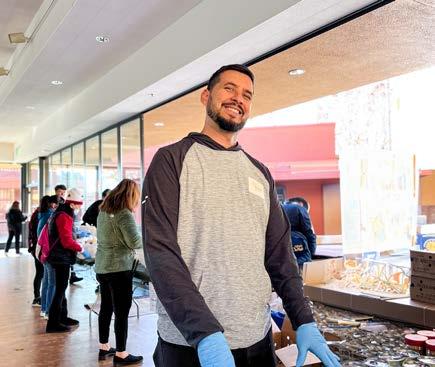 ABEL PADILLA, EXECUTIVE CHEF VOLUNTEERING AT SILICON VALLEY FOOD BANK
ABEL PADILLA, EXECUTIVE CHEF VOLUNTEERING AT SILICON VALLEY FOOD BANK

For Good Eating Company, the pursuit of a regenerative supply chain represents a commitment to both environmental stewardship and ethical sourcing. Because of our dedication and commitment to sustainability, this movement towards regenerative sourcing isn’t just a goal but a tangible reality that is already delivering measurable results.
The key to our approach is forming and maintaining thoughtful, intentional relationships with distribution partners. “Partnership and values alignment are central to our regenerative sourcing journey,” says Claire Turner, a key figure in this initiative. “Through meticulous planning and partnerships, we have increased our regenerative spend year over year,” emphasizes Renee McKeon, Vice President of CSR & Sustainability echoed this view. “Our partnerships with suppliers who share our commitment to sustainability are fundamental to our success,” she says.
A pivotal part of this endeavor is the Regenerative Sourcing Framework, designed to ensure that every step we take aligns with the principles of regeneration. “We made a commitment in 2021 to achieve a 15% regenerative spend,” says Claire, and since then, this commitment has resulted in measurable progress.
Another Impact of this development has been the expansion of sourcing from local farms, particularly in Northern California. Despite facing challenges like adverse weather conditions and fluctuations in the economy, our concerted efforts have resulted in a diverse network of farms contributing to our supply chain. “Our partnership with local farms has not only increased product availability but also enhanced the resilience of the food system,” Claire notes.
In 2023, our efforts yielded concrete results. We increased our purchases year over year, onboarded new partners for consistent local products, and began replicating our model in other regions. The groundwork laid in California paved the way for broader adoption.
Our commitment to ethical sourcing goes beyond just produce. In collaboration with Cream Co. Meats, we’re incorporating regenerative beef into our offerings and reducing our carbon footprint while also supporting sustainable farming practices.
Our collaboration with the World Wildlife Fund (WWF) also serves as a pivotal partnership in defining and vetting new farms for the program. “We engaged in deep discussions to outline criteria aligned with regenerative agriculture principles,” Renee says. Our shared passion for sustainability fueled this endeavor, driving innovation in sourcing practices.
The path toward a regenerative supply chain doesn’t end with local successes. We are actively replicating this model across different regions, a testament to our commitment to scaling impact. “We are refining our framework to ensure it’s adaptable and applicable in diverse contexts”
RENEE MCKEON, VICE PRESIDENT OF SUSTAINABILITY & CSRThe journey of building a regenerative supply chain is one of dedication, collaboration, and evolution – and with each milestone achieved, we move closer to our vision of a more diverse, sustainable food landscape. As we look to the future, we remain steadfast in our mission to create a truly regenerative food system, one partnership at a time.

WE’VE WORKED WITH OVER 30 BIPOC/ UNDERSERVED FARMERS AND 4 VALUES ALIGNED DISTRIBUTION PARTNERS
GEC IS COMMITTED TO ACCELERATING THE TRANSITION TO REGENERATIVE AGRICULTURE BY ALLOCATING 15% OF ITS FOOD SPEND TO SUPPORT FARMS IMPLEMENTING REGENERATIVE PRACTICES
IN NORTHERN CALIFORNIA WE’VE SPENT 500K TO DATE CONTINUED DIRECTLY SUPPORTING BIPOC, REGENERATIVE AND REGENERATIVE TRANSITIONING FARMS.

“As a sustainable food supply chain practitioner, I’ve encountered few partners as willing as GEC to embrace experimentation, compassion, and collaboration in their quest to make their foodservice operations welcoming and inclusive for underserved producers. Developing and executing a sourcing pilot for corporate dining is no easy feat, given the multitude of stakeholders involved – from chefs to distributors to sustainability leaders. GEC’s unwavering dedication to continuous improvement not only reflects regenerative principles but also distinguishes them as leaders with integrity in the foodservice industry. Their commitment has significantly impacted the lives of 30 BIPOC farmers in the region, and SupplyChange is proud to know them as allies in the field of food systems change.”
H NIETO-FRIGA, PRINCIPAL & FOUNDER SUPPLY CHANGE“What does it mean for you and for your business to be a part of the program with Permanent that provides purchasing commitments from large institutional buyers?”
ANSWER TRANSLATED FROM SPANISH:
“It’s been really good, we are in growth and expansion mode due to this program - they have a plan in place and the team orders the same thing every week.”
ADELIO CORONEL, CORONEL PRODUCE FARMGOOD EATING COMPANY’S SMALL & DIVERSE SPEND
January - December 2023 TOTAL SPEND: $35, 817, 655

Small Business Women
Asian Hispanic
Minority/Unknown
Disabled
African American Veteran
LGBTQ
Native American
Disabled Veteran
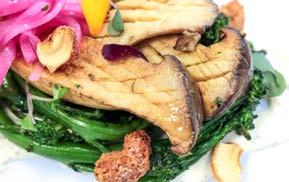
SME + Diverse
$6,730,665 18.76%

We are thrilled to collaborate with more than 30 small and diverse coffee suppliers, each located within a 50-mile radius of our Good Eating Company sites. This initiative allows us to uplift local businesses by offering our guests a selection of local coffee options, while steadfastly prioritizing sustainability.
In choosing coffee roasters for our guests, we carefully select partners who embody qualities we value deeply—exceptional quality, versatility, sustainability, local roots, and fair trade practices. Take, for example, one of our partners who packages their coffee in compostable bags, or another who delivers in reusable 5-gallon containers. These efforts, though demanding, promise substantial long-term environmental benefits that far exceed the immediate challenges. These are the partners we pursue—those whose commitment to environmental and community benefits mirrors our own.
At Good Eating Company, our coffee program celebrates enhancing the guest experience with local, sustainable coffee that supports community businesses, offering uniquely engaging and extraordinary coffee. experiences.

“Our local coffee program really boils down to the client experience. When employees see coffees that they find in their favorite local coffee shop, it signals that we’re serious about quality and support businesses within their community. It also allows us to bring coffee partners in for brewing classes, tasting events and other interactive experiences. The program highlights craft, community and engagement, leading clients to feel like they’re getting something unique and extraordinary.”
GRANT MACHAMER, COFFEE DIRECTOR FOR GOOD EATING COMPANY

Good Eating Company was founded on the philosophy that fresh, delicious food has the power to shape culture, build communities and connect people through innovative, sustainable solutions. Our quarterly volunteer events exemplify our commitment to culinary excellence and community service. In 2023, we partnered with four Bay Area nonprofits, including The San Francisco Food Bank, Farming Hope , Kitchen Table Advisors and Silicon Valley Food Bank, to host four impactful events.
These volunteer events give back to the community and serve as the cornerstone of a culture of community service within our organization, providing a unique opportunity for team members to connect in person and creating bonds beyond virtual interactions. According to District Manager Andrew Camuso, the experiences are so enriching that they almost make you forget you’re volunteering.
“We strive to tie in food with the organizations we work with, making each event meaningful and aligned with GEC’s culinary expertise,” says Claire Turner, Director of Sustainability. From partnering with food banks to participating in events supporting small farmers, our team members actively engage with the community while promoting the principles of regenerative agriculture and sustainability.
“Feedback from the community organizations has been positive,” Turner says. “These volunteer efforts seamlessly integrate with existing volunteer programs, providing valuable support without overwhelming the recipients.
Our ultimate goal is to build long-term relationships with selected nonprofit organizations and expand our events beyond Northern California.”

It’s my vision and hope that this program instills a culture of sustainability and community service within our teams, to make sure we, as leaders of Good Eating Company, are leading by example.”CLAIRE TURNER, DIRECTOR OF SUSTAINABILITY

